Unit 6 TV programmes period 4 Grammar(共25张PPT,含音频)
文档属性
| 名称 | Unit 6 TV programmes period 4 Grammar(共25张PPT,含音频) | 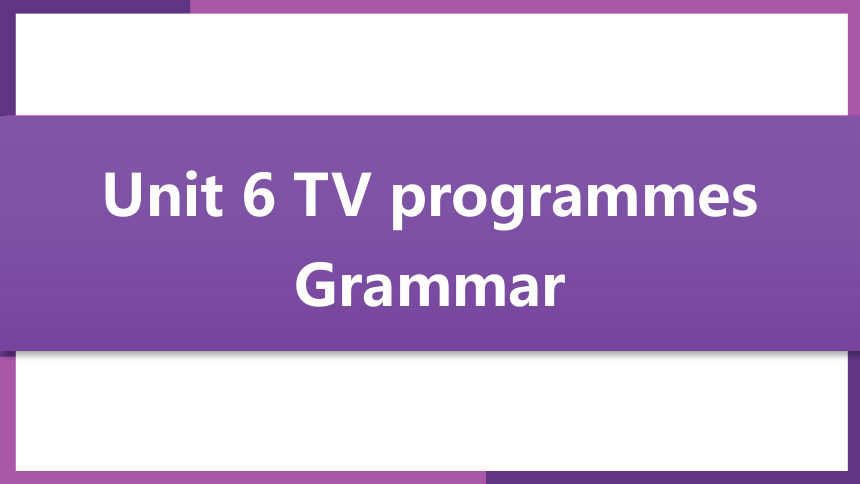 | |
| 格式 | zip | ||
| 文件大小 | 2.1MB | ||
| 资源类型 | 教案 | ||
| 版本资源 | 牛津译林版 | ||
| 科目 | 英语 | ||
| 更新时间 | 2022-06-06 20:43:41 | ||
图片预览

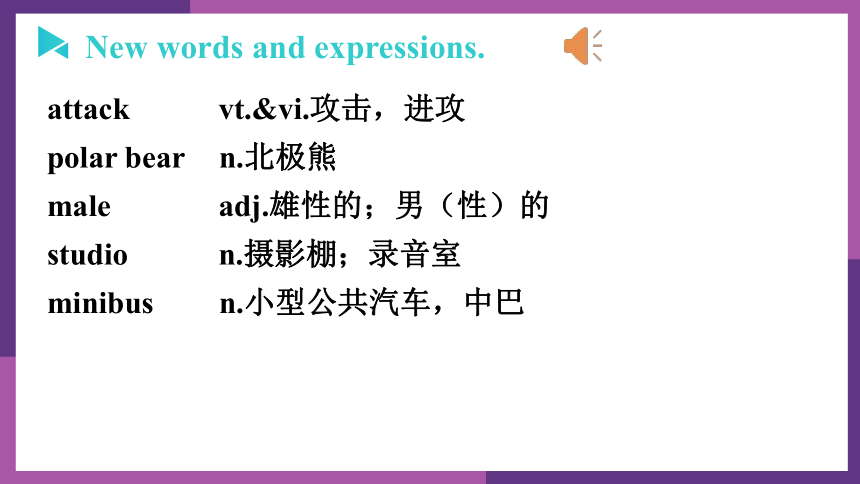
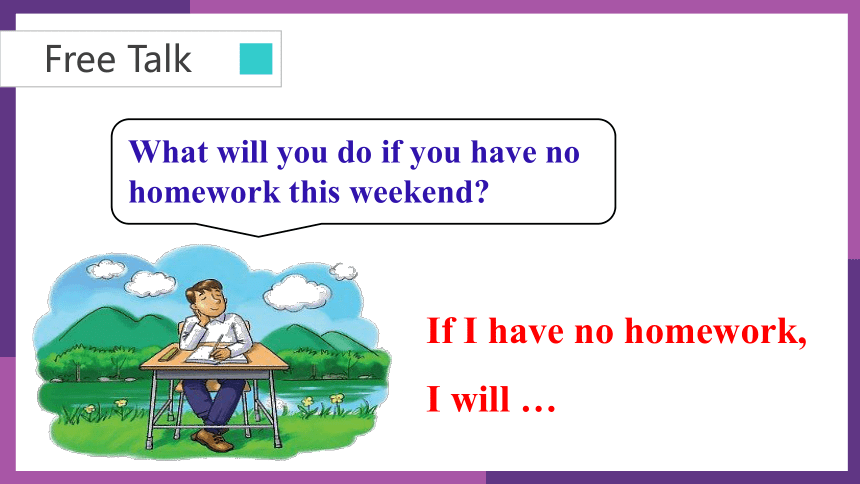
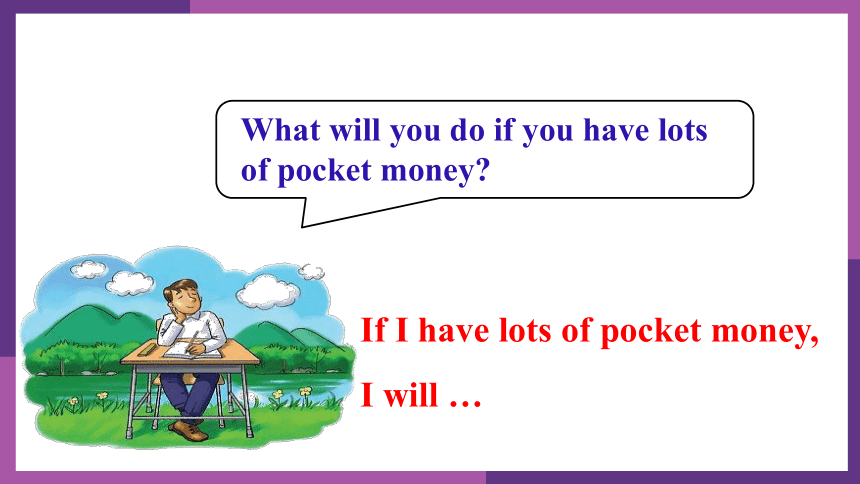
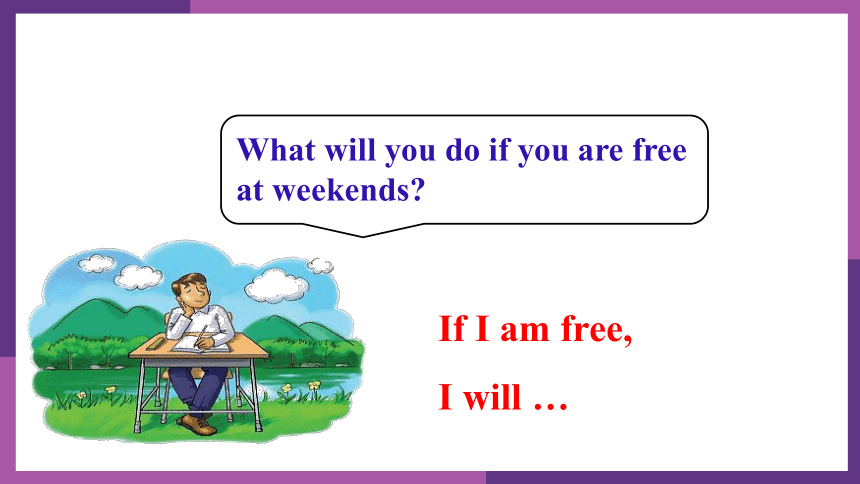
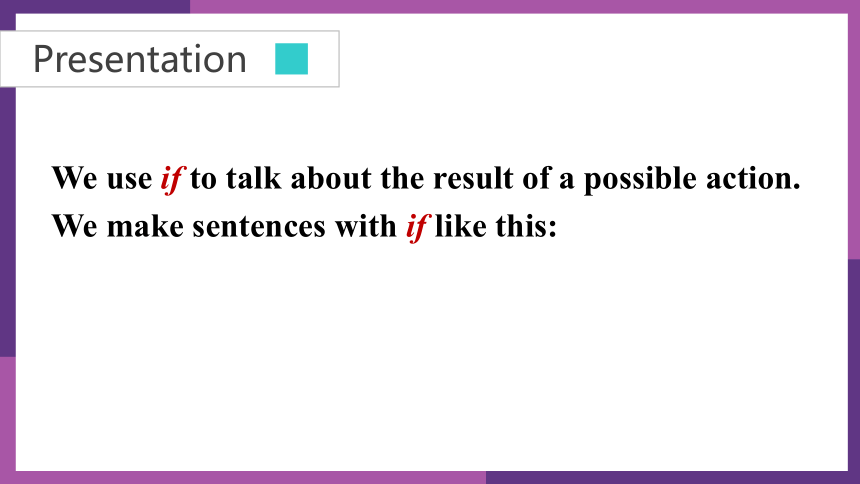
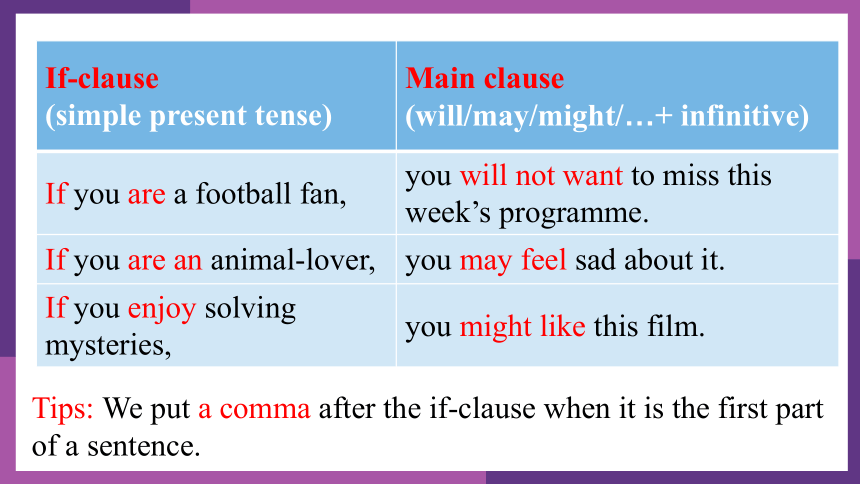
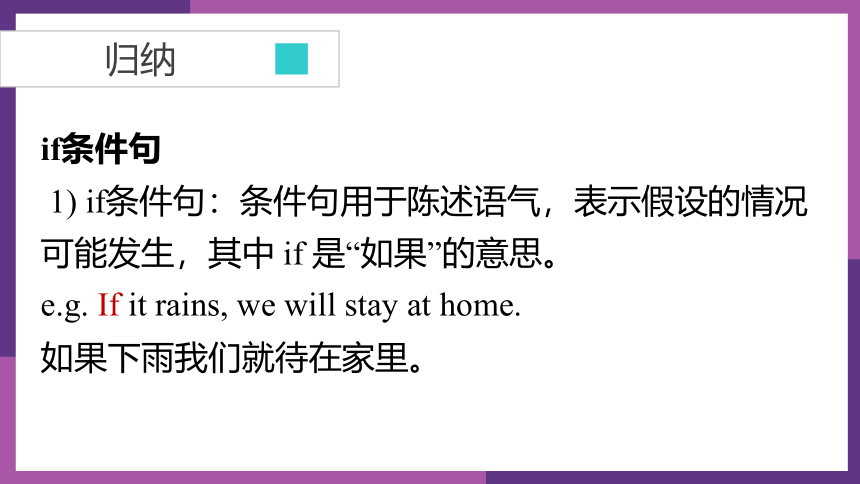
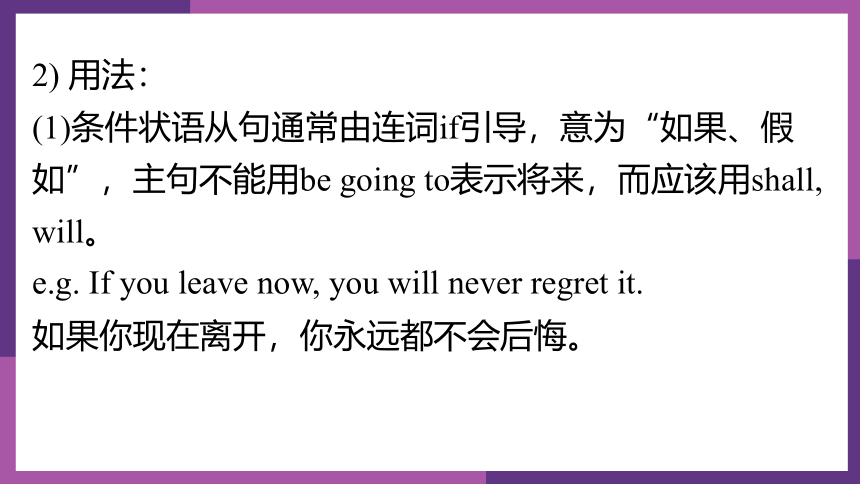
文档简介
(共25张PPT)
Unit 6 TV programmes
Grammar
New words and expressions.
attack vt.&vi.攻击,进攻
polar bear n.北极熊
male adj.雄性的;男(性)的
studio n.摄影棚;录音室
minibus n.小型公共汽车,中巴
What will you do if you have no homework this weekend
If I have no homework,
I will …
Free Talk
What will you do if you have lots of pocket money
If I have lots of pocket money,
I will …
What will you do if you are free at weekends
If I am free,
I will …
We use if to talk about the result of a possible action. We make sentences with if like this:
Presentation
If-clause (simple present tense) Main clause
(will/may/might/…+ infinitive)
If you are a football fan, you will not want to miss this week’s programme.
If you are an animal-lover, you may feel sad about it.
If you enjoy solving mysteries, you might like this film.
Tips: We put a comma after the if-clause when it is the first part of a sentence.
if条件句
1) if条件句:条件句用于陈述语气,表示假设的情况可能发生,其中 if 是“如果”的意思。
e.g. If it rains, we will stay at home.
如果下雨我们就待在家里。
归纳
2) 用法:
(1)条件状语从句通常由连词if引导,意为“如果、假如”,主句不能用be going to表示将来,而应该用shall, will。
e.g. If you leave now, you will never regret it.
如果你现在离开,你永远都不会后悔。
(2)if “如果”,引导条件状语从句,主句用一般
将来时,从句则用一般现在时。
e.g. If it rains tomorrow, I shan’t climb the hills.
如果明天下雨,我就不爬山了。
(3)主句是祈使句或含有情态动词,从句也用一般现在时。
e.g. Please call me if he comes next Sunday.
如果他下周日过来请打电话给我。
注意:
宾语从句中的if与条件状语从句if的区 别。宾语从句中的if “是否”相当于 whether, 引导宾语从句, 时态需根据语境确定。如果主句用一般现在时, 从句可以根据具体情况选用时态, 如果主句用一般过去时, 从句必须用过去时的某种形式。
What will happen if ...
Millie is thinking about herself, her friends and TV plete the sentences with the correct forms of the verbs in brackets.
A1
If I ____ (go, will go) to the Reading Club this afternoon, I ______________( do not have, may not have) any time to watch TV.
2. If Simon_____(gets, will get) home late, he __________ (misses, will miss) his favourite cartoon.
go
may not have
gets
will miss
3. If Amy __________(completes, will complete) all her homework quickly, she ___________ (watches, will watch) the chat show.
4. If Daniel ________ (takes, will take) part in the game show, he _________ (wins, might win) a prize.
5. If Sandy _______(finds, will find) a programme interesting, she _____________ (introduces, will
introduce) it to us.
completes
will watch
takes
might win
finds
will introduce
We often use the simple __________ (future, present) tense in the if-clause. We need a _________ (comma, full stop) after the if-clause when it is the first part
of a sentence.
present
comma
Work out the rule!
Asking about animals
Millie watched a documentary about animals. Help Millie answer her father’s questions with the help of the words in the box.
A2
Dad: What will a bear do if it is in danger
Millie: If a bear_____________, it ____________ people.
Dad: What will a polar bear do if it is hungry
Millie: If a polar bear ____________, it ___________ fish from the water.
is in danger
will attack
is hungry
will catch
Dad: What will elephants do if they are thirsty
Millie: If elephants ______________, they ____________ till
they find a river.
Dad: What will tigers do if they live in the wild
Millie: Tigers _________________ for their own food if they
_________________.
Dad: What will tigers do if they have babies
Millie: Tigers ________ as a family if they _____________.
Dad: What will male wolves do if there is danger
Millie: Male wolves __________their families if there _______.
are thirsty
will walk
will hunt
live in the wild
will live
have babies
will protect
is danger
Why are so many wild animals in danger
What can we do to help them
Discussion
Animals are our friends.
Protecting animals is protecting ourselves
The situation will continue unless humans stop hunting them for their fur and bones.
→ The situation will continue if humans do not stop hunting them for their fur and bones.
Unless it rains tomorrow, we are going to play football in the park.
→ If it does not rain tomorrow, we are going to play football in the park.
Presentation
1. We can use unless to say that something can only happen or be true in a particular situation.
2. Sometimes we can use if ... not to replace unless.
3.The unless-clause can come first or after the main clause.
unless 条件句
unless引导的条件句,表示强烈的否定。翻译为“除非……”“非……不可”。
e.g. You will fail unless you work harder.
你不努力就会失败的。
=You will fail if you do not work harder.
注意: unless 从句里的谓语只能是肯定式, 因为本身unless表示否定。
归纳
1. ________ it snows tomorrow, we will have a day or two off.
2.We won't go to the party ________ he invites us.
3. ________ he wants to see me, you can tell him to wait.
4. ________ my grandpa wears glasses, he can see better.
5.You won't get lost in the mountains ________ you take a map.
6.You will get a toothache ________ you do clean your teeth regularly.
Exercise
用连词if 或unless填空
If
unless
If
If
if
unless
You’d better travel around Nanjing with a local tour guide ______ you want to learn more about its culture.
A. unless B. until C. although D. if
2. If there ______ no buying and selling of animals, there _____ no killing in the future.
A. is; will be B. will be; will be
C. is; is D. will be; is
3. --This is between you and me.
-- I promise. I won’t tell others ___ you say I can.
A. unless B. or C. since D. and
4. I’m waiting for my friend. _______, I’ll go shopping alone.
A. If she comes B. If she won’t come
C. If she doesn’t come D. If she will come
GOOD JOB
Unit 6 TV programmes
Grammar
New words and expressions.
attack vt.&vi.攻击,进攻
polar bear n.北极熊
male adj.雄性的;男(性)的
studio n.摄影棚;录音室
minibus n.小型公共汽车,中巴
What will you do if you have no homework this weekend
If I have no homework,
I will …
Free Talk
What will you do if you have lots of pocket money
If I have lots of pocket money,
I will …
What will you do if you are free at weekends
If I am free,
I will …
We use if to talk about the result of a possible action. We make sentences with if like this:
Presentation
If-clause (simple present tense) Main clause
(will/may/might/…+ infinitive)
If you are a football fan, you will not want to miss this week’s programme.
If you are an animal-lover, you may feel sad about it.
If you enjoy solving mysteries, you might like this film.
Tips: We put a comma after the if-clause when it is the first part of a sentence.
if条件句
1) if条件句:条件句用于陈述语气,表示假设的情况可能发生,其中 if 是“如果”的意思。
e.g. If it rains, we will stay at home.
如果下雨我们就待在家里。
归纳
2) 用法:
(1)条件状语从句通常由连词if引导,意为“如果、假如”,主句不能用be going to表示将来,而应该用shall, will。
e.g. If you leave now, you will never regret it.
如果你现在离开,你永远都不会后悔。
(2)if “如果”,引导条件状语从句,主句用一般
将来时,从句则用一般现在时。
e.g. If it rains tomorrow, I shan’t climb the hills.
如果明天下雨,我就不爬山了。
(3)主句是祈使句或含有情态动词,从句也用一般现在时。
e.g. Please call me if he comes next Sunday.
如果他下周日过来请打电话给我。
注意:
宾语从句中的if与条件状语从句if的区 别。宾语从句中的if “是否”相当于 whether, 引导宾语从句, 时态需根据语境确定。如果主句用一般现在时, 从句可以根据具体情况选用时态, 如果主句用一般过去时, 从句必须用过去时的某种形式。
What will happen if ...
Millie is thinking about herself, her friends and TV plete the sentences with the correct forms of the verbs in brackets.
A1
If I ____ (go, will go) to the Reading Club this afternoon, I ______________( do not have, may not have) any time to watch TV.
2. If Simon_____(gets, will get) home late, he __________ (misses, will miss) his favourite cartoon.
go
may not have
gets
will miss
3. If Amy __________(completes, will complete) all her homework quickly, she ___________ (watches, will watch) the chat show.
4. If Daniel ________ (takes, will take) part in the game show, he _________ (wins, might win) a prize.
5. If Sandy _______(finds, will find) a programme interesting, she _____________ (introduces, will
introduce) it to us.
completes
will watch
takes
might win
finds
will introduce
We often use the simple __________ (future, present) tense in the if-clause. We need a _________ (comma, full stop) after the if-clause when it is the first part
of a sentence.
present
comma
Work out the rule!
Asking about animals
Millie watched a documentary about animals. Help Millie answer her father’s questions with the help of the words in the box.
A2
Dad: What will a bear do if it is in danger
Millie: If a bear_____________, it ____________ people.
Dad: What will a polar bear do if it is hungry
Millie: If a polar bear ____________, it ___________ fish from the water.
is in danger
will attack
is hungry
will catch
Dad: What will elephants do if they are thirsty
Millie: If elephants ______________, they ____________ till
they find a river.
Dad: What will tigers do if they live in the wild
Millie: Tigers _________________ for their own food if they
_________________.
Dad: What will tigers do if they have babies
Millie: Tigers ________ as a family if they _____________.
Dad: What will male wolves do if there is danger
Millie: Male wolves __________their families if there _______.
are thirsty
will walk
will hunt
live in the wild
will live
have babies
will protect
is danger
Why are so many wild animals in danger
What can we do to help them
Discussion
Animals are our friends.
Protecting animals is protecting ourselves
The situation will continue unless humans stop hunting them for their fur and bones.
→ The situation will continue if humans do not stop hunting them for their fur and bones.
Unless it rains tomorrow, we are going to play football in the park.
→ If it does not rain tomorrow, we are going to play football in the park.
Presentation
1. We can use unless to say that something can only happen or be true in a particular situation.
2. Sometimes we can use if ... not to replace unless.
3.The unless-clause can come first or after the main clause.
unless 条件句
unless引导的条件句,表示强烈的否定。翻译为“除非……”“非……不可”。
e.g. You will fail unless you work harder.
你不努力就会失败的。
=You will fail if you do not work harder.
注意: unless 从句里的谓语只能是肯定式, 因为本身unless表示否定。
归纳
1. ________ it snows tomorrow, we will have a day or two off.
2.We won't go to the party ________ he invites us.
3. ________ he wants to see me, you can tell him to wait.
4. ________ my grandpa wears glasses, he can see better.
5.You won't get lost in the mountains ________ you take a map.
6.You will get a toothache ________ you do clean your teeth regularly.
Exercise
用连词if 或unless填空
If
unless
If
If
if
unless
You’d better travel around Nanjing with a local tour guide ______ you want to learn more about its culture.
A. unless B. until C. although D. if
2. If there ______ no buying and selling of animals, there _____ no killing in the future.
A. is; will be B. will be; will be
C. is; is D. will be; is
3. --This is between you and me.
-- I promise. I won’t tell others ___ you say I can.
A. unless B. or C. since D. and
4. I’m waiting for my friend. _______, I’ll go shopping alone.
A. If she comes B. If she won’t come
C. If she doesn’t come D. If she will come
GOOD JOB
